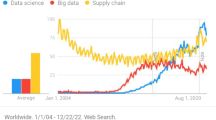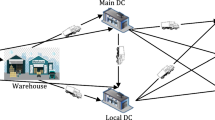Abstract
In recent years, global demand for and dependency on resources has increased with the advancement of technology, development of a global economy, societal progress, and rapid population growth. The concept of a product service system (PSS) has been actively promoted by some companies in the US and Europe to mitigate this resource strain and has resulted in significant effects. The objective of this study is to construct a renting system in a reverse logistics environment on the basis of the PSS theory: this system includes the complete management of product examination, maintenance, upgrading, products recycling, and final waste disposal. Due to the different procurement processes of PSS, the following two product operations are analyzed: (1) procurement of new products and (2) rental of products. The simulation model is analyzed by using three different scheduling and dispatching rules (shortest processing time, first come first served, and earliest due date). A home/office electronic case study is conducted to validate its implementation.
Similar content being viewed by others
References
Amini MM, Donna R-R, Bienstock CC (2005) Designing a reverse logistics operation for short cycle time repair services. Int J Prod Econ 96(3):367–380
Baines TS, Lightfoot HW, Evans S, Neely A, Greenough R, Peppard J, Roy R, Shehab E, Braganza A, Tiwari A, Alcock JR, Angus JP, Bastl M, Cousens A, Irving P, Johnson M, Kingston J, Lockett H, Martinez V, Michele P, Tranfield D, Walton IM, Wilson H (2007) State-of-the-art in product-service systems. Proc Inst Mech Eng B J Eng Manuf V221:10
Brezet H (2000) Product-service substitution: examples and cases from the Netherlands, ''Funktionsförsäljning''-product-service systems, Stockholm, Swedish EPA, AFR-report 299
Dar-El EM, Wysk RA (1982) Job shop scheduling—a systematic approach. J Manuf Syst 1:77–88
Fink A, Reiners T (2006) Modeling and solving the short-term car rental logistics problem. Transp Res Part E Logist Trans Rev 42(4):272–292
Fishbein B, McGarry LS, Dillon PS (2001) Leasing: a step toward producer responsibility. J Ind Ecol 5(4):118–120
Guide VDR Jr, Srivastava R, Kraus ME (1997) Product structure complexity and scheduling of operations in recoverable manufacturing. Int J Prod Res 35(11):3179–3199
Kara S, Rugrungruang F, Kaebernick H (2007) Simulation modelling of reverse logistics networks. Int J Prod Econ 106:61–69
Makower J (2001) The clean revolution: technologies from the leading edge, Presented at the Global Business Network Worldview Meeting, May 14-16, San Francisco Bay Area
Mont O, Dalhammar C, Jacobsson N (2006) A new business model for baby prams based on leasing and product remanufacturing. J Clean Prod 14:1509–1518
Mont O (2002) Clarifying the concept of product service system. J Clean Prod 10:237–245
Philipoom PR, Russel RS, Fry TD (1991) A Preliminary investigation of multi-attribute based sequencing rules for assembly shops. Int J Prod Res 29(no. 4):739–753
Roy R (2000) Sustainable product service systems. Futures 32:289–299
Stahel W, Reday G (1976) Jobs for tomorrow, the potential for substituting manpower for energy. Vantage Press, Brussels
Williams A (2006) Product-service systems in the automotive industry: the case of micro-factory retailing. J Clean Prod 14:172–184
Author information
Authors and Affiliations
Corresponding author
Rights and permissions
About this article
Cite this article
Kuo, T.C. Simulation of purchase or rental decision-making based on product service system. Int J Adv Manuf Technol 52, 1239–1249 (2011). https://doi.org/10.1007/s00170-010-2768-2
Received:
Accepted:
Published:
Issue Date:
DOI: https://doi.org/10.1007/s00170-010-2768-2




